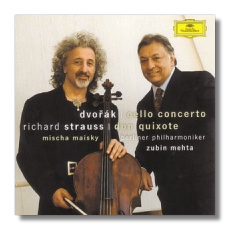
The Internet's Premier Classical Music Source
Related Links
- Latest Reviews
- More Reviews
-
By Composer
-
Collections
DVD & Blu-ray
Books
Concert Reviews
Articles/Interviews
Software
Audio
Search Amazon
Recommended Links
Site News
 CD Review
CD Review
Mischa Maisky Live

- Antonín Dvořák: Cello Concerto in B minor
- Richard Strauss: Don Quixote
Mischa Maisky, cello
Tabea Zimmermann, viola
Berlin Philharmonic Orchestra/Zubin Mehta
Deutsche Grammophon 474780-2 DDD 80:20
These performances were recorded in front of an audience in Berlin's Philharmonie during December 2002. Maisky has dedicated this disc to his old mentor, Gregor Piatigorsky, who died thirty years earlier. Piatigorsky, of course, was a master in this repertoire, and his recordings of it endure even today. Maisky is a fine cellist, but it is less likely that these readings will stand the test of time the way that Piatigorsky's have.
It's not because Maisky lacks his mentor's technical ability. The problem is with the interpretations. Maisky is willful, much as Leonard Bernstein was when he conducted the Dvořák with Maisky back in the 1980s, but without Bernstein's electric personality. In spite of it all, there's a reticence to Maisky's playing that is out of character with this music. This reticence is emphasized by Mehta's conducting, which is correct, but thick and not very interesting. It's as if Mehta is trying to remove the last possibility that some listeners might find these works vulgarly exciting. (If only Mehta would reclaim the passion he had access to in the 1960s and 70s!) The coda to the Dvořák's opening movement, for example, doesn't get anyone's adrenaline flowing, and the opening minutes of the finale, usually so compelling, are even more stolid. (For what its worth, Maisky comments that he has removed some of the "distortions" that have become part of this work's tradition since the very first performance.)
Don Quixote is even more problematic. Mehta dusts off every single orchestral detail with care, but in terms of emotion, he and Maisky draw an almost complete blank. The cellist doesn't succeed in painting a multifaceted portrait of the knight. Shorn of its humanism, as it is here, Don Quixote is not much more than a series of noisy but cleverly orchestrated episodes.
Heard in concert, I'm sure these performances were not without their satisfactions, but for home listening, they fall short. Better Dvořáks can be had from Rostropovich/Karajan (for example), and better Don Quixotes from Yo-Yo Ma and Pierre Fournier (the latter also with Karajan.).
Copyright © 2004, Raymond Tuttle


















